If you’re a fan of area controlling strategy games, 2-5 player The Wolves from designers Ashwin Kamath and Clarence Simpson (published by Pandasaurus Games) is the game for you. Players must build the largest, most dominant pack by claiming territory, recruting lone wolves, and hunting prey. However don’t expand too recklessly or rival packs might lure your wolves away. Highly interactive, I really enjoyed playing it!
What’s In The Box?
The Wolves comes with 1 start board with a chasm filled with water (used in more than 2 player games) and 10 region boards (each has 15 hexes), a double sided Moonlight Board used for scoring, 30 double sided terrain tiles for up to 5 players, 5 double sided player boards, 10 region scoring tokens, and 20 prey tokens (five types of prey).
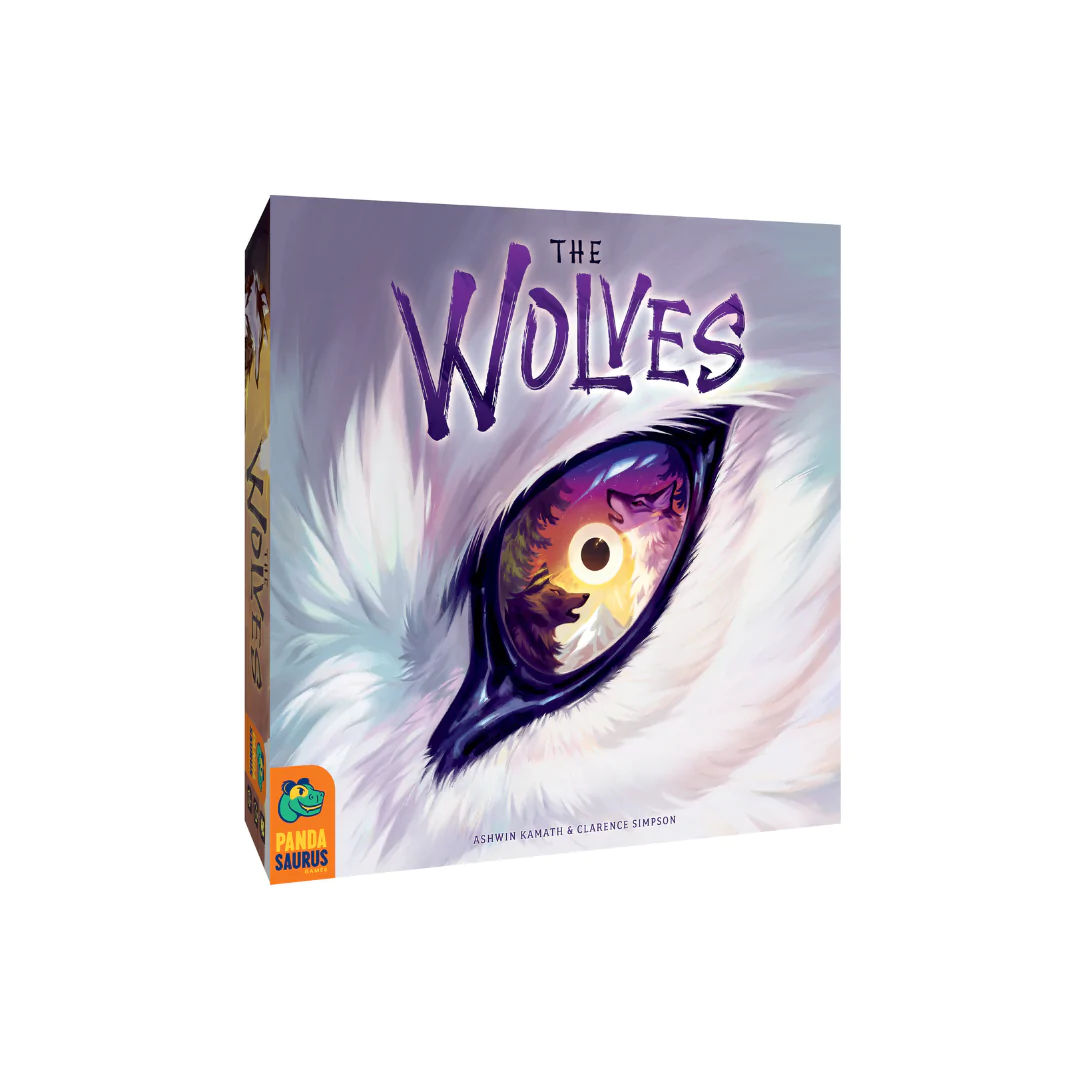
There are also 20 alpha Wolf meeples, 40 pack wolf meeples, 60 dens, and 20 lairs all in the 5 wolf colors, 12 bonus terrain tokens, 20 lone wolf tokens, 50 victory point tokens, 12 bonus action tokens, 4 region scoring remainder tokens, and 5 player reference cards. Whew! (The wolves are quite fun and I almost want to paint some eyes on them…)
While the game has a lot of pieces, the insert has spaces for the player cards, region boards, and the meeples all come prebagged, but definitely have some smaller bags on hand for once all the pieces are removed from the cardboard.
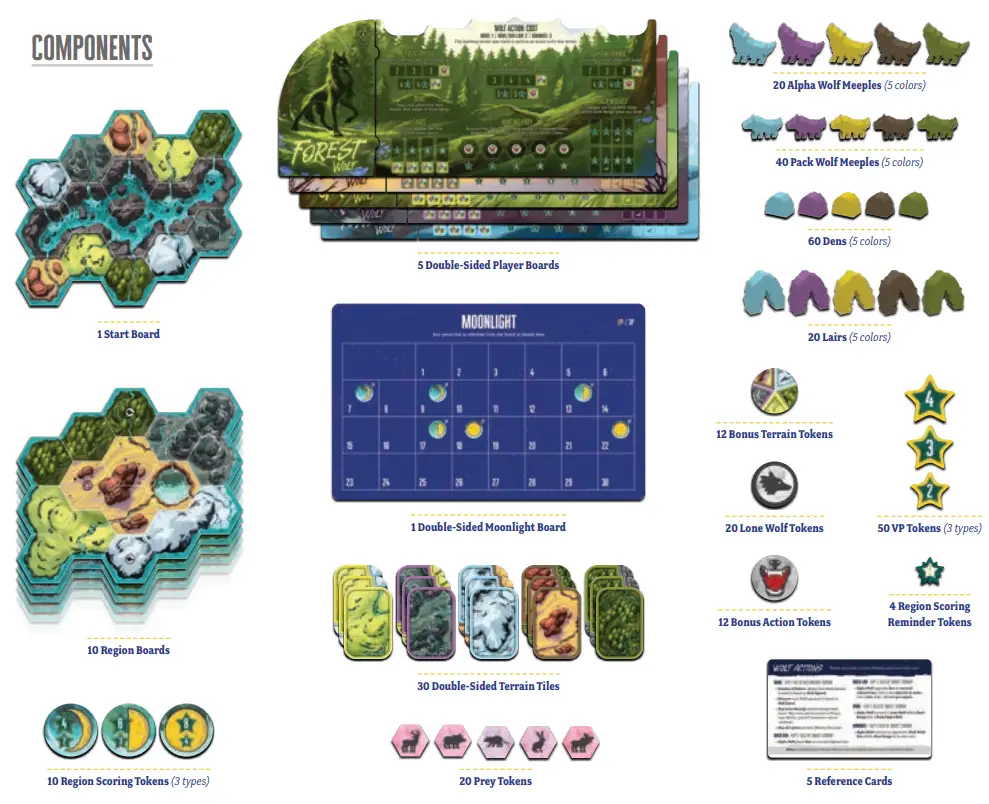
One of the draws to this game is the beautiful art by Pauliina Linjama and I love how detailed the region and player boards are. The meeples are also of great quality and didn’t have any chipped pieces or issues.
How’s it play?
My least favorite part of The Wolves is setting it up (though that’s my least favorite part of any board game). It does take some time to set everything up because once you’ve placed the region boards according to the number of players, you have to set up all the lone wolf tokens, prey, dens, and wolf pieces per the instructions. Once that’s done though, game play goes pretty quickly!
Each player chooses the wolf that they want to play as, either Rocky, Desert, Tundra, Grass, and Forest and sets up their player board with terrain cards and dens, lairs, and wolves spread around the attributes on the board. As gameplay progresses, placing dens on the terrains allows players to upgrade their pack spread (how many can move at once), wolf speed (how many hexes each wolf can move), and howl range (how far the alpha can howl at a lone wolf or to dominate another player’s wolves).
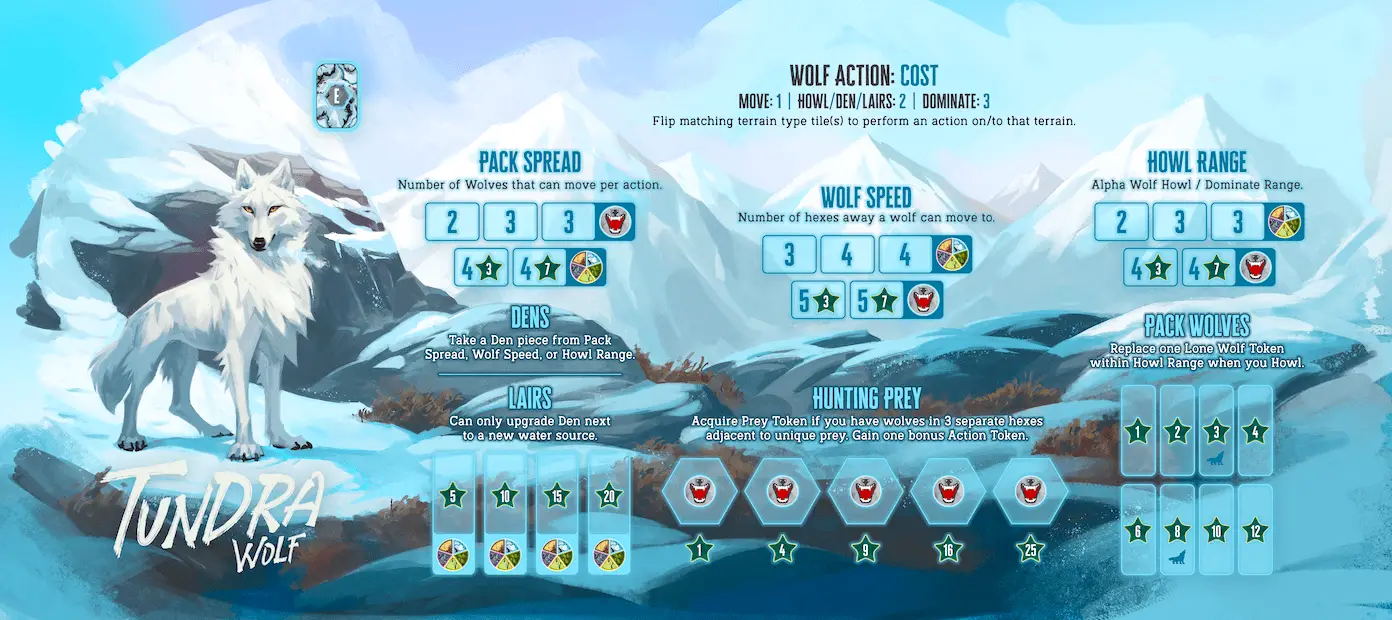
Upgrading a den into a lair (which can only occur to dens placed next to a water source) will provide points at the end of the scoring as does turning lone wolves into pack wolves and hunting prey.
The Wolves challenges players to score the most victory points which includes fighting for the control of a region by having the most wolves in one area (which is scored at each scoring point on the Moonlight board), hunt the prey, and increasing pack strength by improving the attributes I mentioned above.
Players can Move their wolves around the board by flipping a tile that matches the terrain hex, Build Dens (only in hexes next to one occupied by your Alpha Wolf), Upgrade that den into a lair (must be adjacent to the water source and an Alpha Wolf still has to be on or next to that hex), Howl at lone wolves to convert them to pack wolves, and Dominate by swapping an opponent’s Pack Wolf or Den Marker.
Each turn is two actions regardless of the cost unless you pick up bonus action tokens throughout the game. {layers must flip one, two or three tiles of the terrain that they wish to move, build, or howl/dominate. The only way to flip three tiles is if you are within your own wolf pack’s associated terrain (tundra wolf can only dominate a wolf in another tundra hex) or if they flip two tiles elsewhere and use a bonus terrain tile.
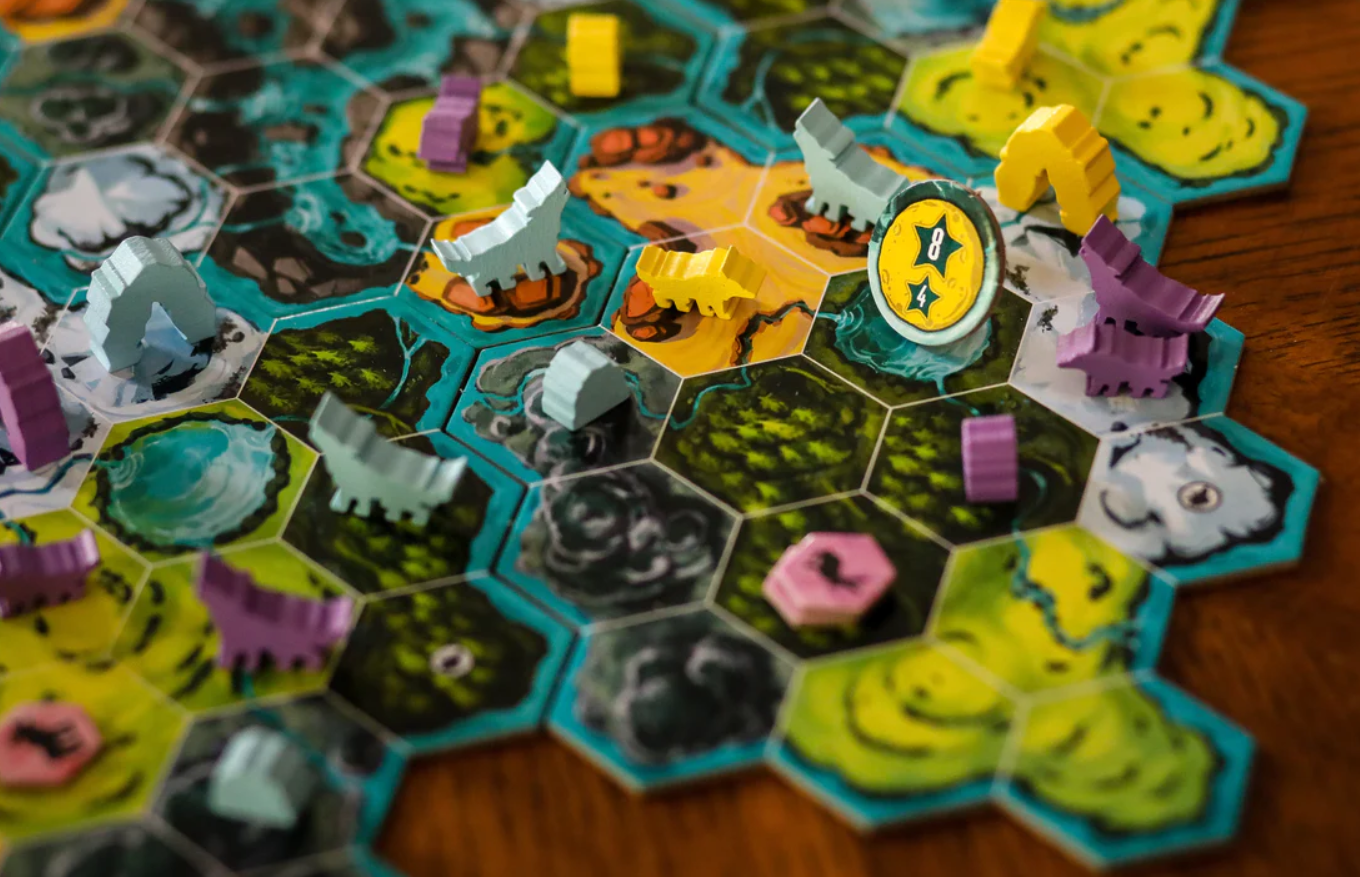
All of these actions require the players to really strategize ahead which can either lengthen the game if people take too long (like my friend and I totally did the first game through) or be really quick if you set limits on how much time each player gets to decide what to do next.
The major difference between a two player game or more than three is that in a two player game there is a 3 pack which is set up and in the way of making moves or dominating reducing the number of available hexes during play and the board with the chasm isn’t used in the former.
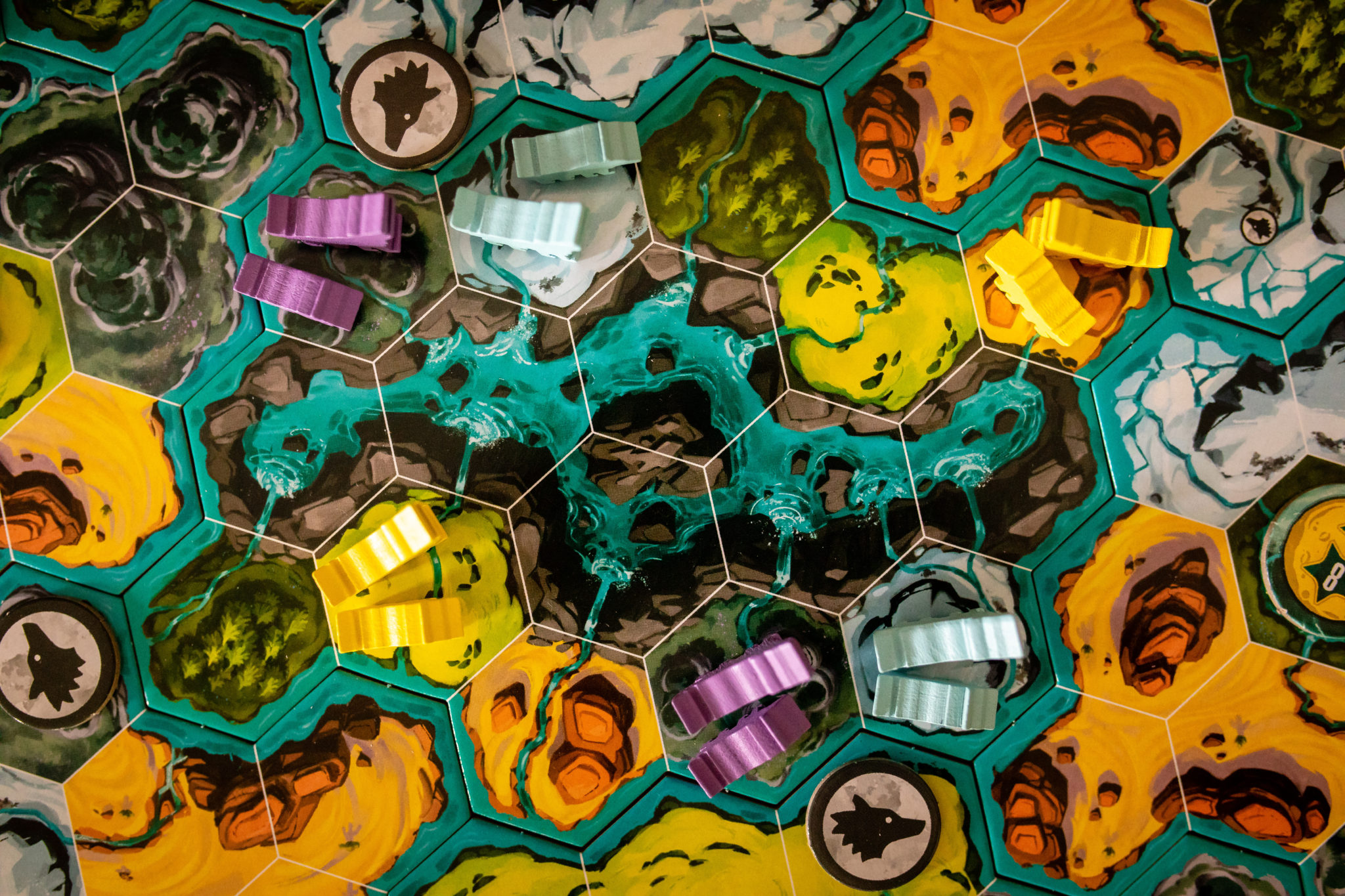
I wish we had the chasm in the two player version though because it would allow for a few more lairs and simultaneously challenge players to really think about where to place their lairs because you can only have one lair per player in each region.
Scoring occurs three times throughout the game as players place dens and other items on the Moonlight Board. To determine scoring, all VP tokens acquired during the Region Scoring (crescent, quarter, and full moon periods) and the highest VP number revealed in each of the 6 tracks on the player boards. These are the pack spread, wolf speed, howl range, lairs, hunting prey, and pack wolves.
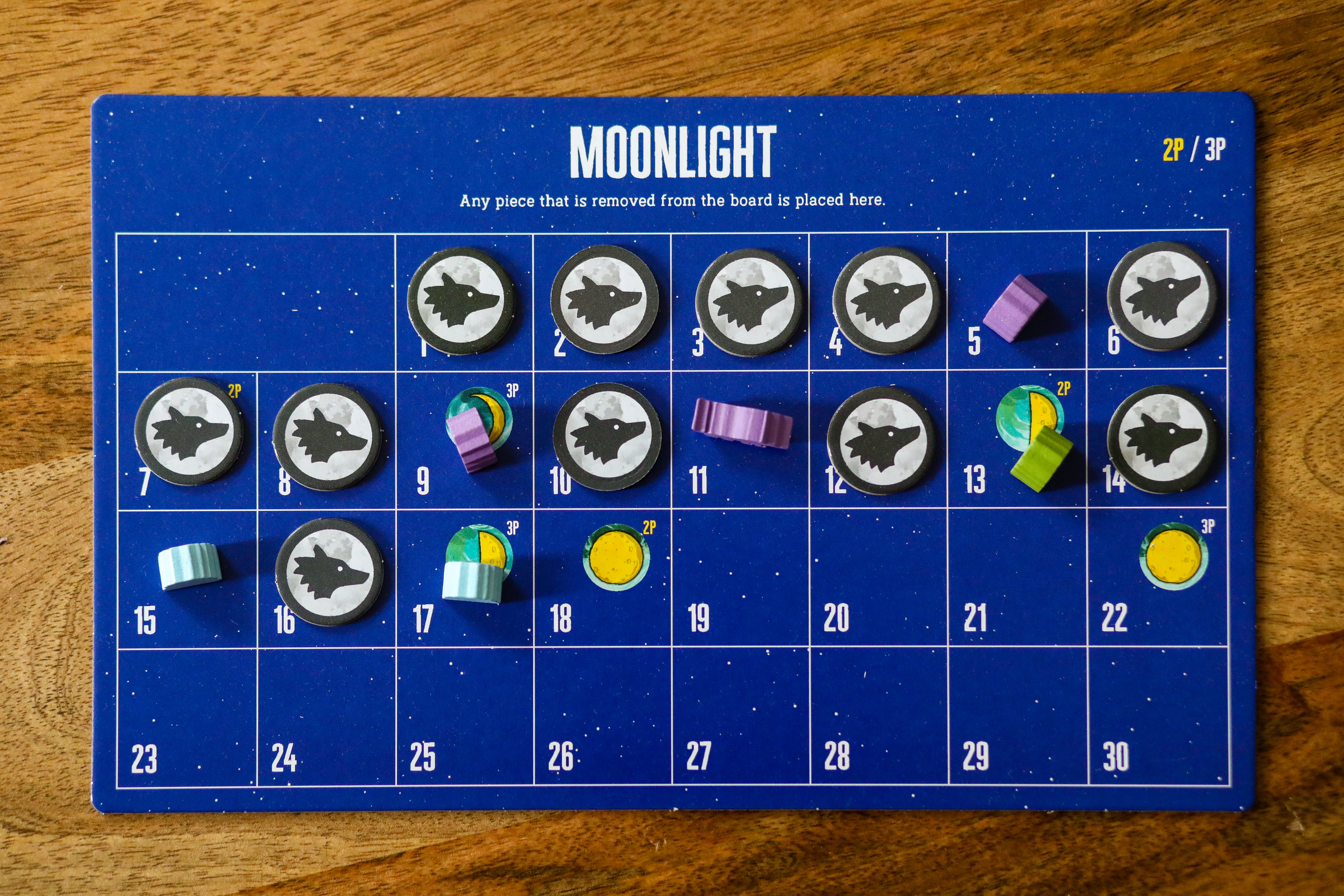
The Verdict?
Overall, I really enjoyed The Wolves. I’m a huge fan of wolves and honestly was really excited to see this game because even though it is focused on the Alpha wolf premise, the packs, dens, and lairs all make an impact so it’s not just one Alpha to win them all.
Except for some confusion in the rules and having the set up sections seperate, the rule book is quite detailed and has examples which are really helpful for the first few playthroughs.
Each action requires forethought and careful deliberation if you really want to win. It’s also a ton of fun to try to capture prey (which requires three wolves adjacent to the prey token) and dominate other player’s packs which require even more thinking ahead. Even that thinking ahead won’t matter if your opponent moves a piece or if you don’t have enough tiles to flip!
The art is absolutely beautiful and I love the saturated palette making it just plain fun to look at! The Wolves takes roughly an hour and half including set up which is on the longer end for what I’m used to playing, but feels much faster because of the interactivity.
You can review the rules before picking up The Wolves on the site at an MSRP of $49.95.
Images and review copy courtesy of Pandasaurus
Have strong thoughts about this piece you need to share? Or maybe there’s something else on your mind you’re wanting to talk about with fellow Fandomentals? Head on over to our Community server to join in the conversation!

